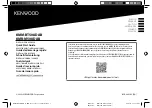
VHF Transceiver Manual
SM05 Rev 4.00
Page 1-2
Nov 26, 2003
ENG-FORM: 800-0107.DOT
CONFIDENTIAL AND PROPRIETARY TO NORTHERN AIRBORNE TECHNOLOGY LTD.
The physical enclosures for the Tac/Com transceivers are die-cast, with fully RF
gasketed closures, to provide the most rugged possible unit. The design is qualified to
MIL-STD 810D for environmental performance.
Many new band splits are supported by the Tac/Com family, providing airborne systems
for new frequencies now required by land based law enforcement agencies and public
service groups. These new splits can be mixed with other existing equipment via the
Tac/Com control head to produce full function systems with minimum cost.
The thermal management of the radio is outstanding, resulting in minimal case
temperature rise regardless of operational cycles. This is a significant departure from
many existing systems which are at design limits even with low duty cycles.
A wide range energy conversion power supply is used in the transceivers for 28VDC
operation, which significantly reduces both current consumption from the aircraft bus,
and waste heat generation.
All transceivers have the same mounting footprint, RF connector, and plug-compatible
interconnect, for ease of installation.
Unit covers have integral screws (anti-tamper) and hardware for ease of bench
servicing (no more lost screws). Mating logic/interface connectors use gold contacts,
and the Mil-spec type "N" RF connector is tarnish resistant, for improved performance in
humid environments.
1.4
Specifications
1.4.1
System
Specifications
Frequency range
NT30A
29- 41.995 MHz
NT30B
34- 49.995 MHz
NT136 138-155.995
MHz
NT150 148-173.995
MHz
Input
Power
Nominal
28
VDC
Current
Consumption RX
(squelched)
0.4-0.7 A (typ.)
TX
2.0 A (typ.)
Frequency
Stability
0.0005%
Channel
Spacing
5.0
kHZ*
Summary of Contents for NT030
Page 2: ......
Page 4: ......
Page 6: ......
Page 20: ......
Page 21: ...Confidential and Proprietary to NAT ...
Page 22: ......
Page 23: ......
Page 24: ......
Page 25: ......
Page 26: ......
Page 27: ...Confidential and Proprietary to NAT ...
Page 28: ......
Page 29: ...Confidential and Proprietary to NAT ...
Page 30: ......
Page 31: ...Confidential and Proprietary to NAT ...
Page 32: ......
Page 33: ...Confidential and Proprietary to NAT ...
Page 34: ......
Page 35: ...Confidential and Proprietary to NAT ...
Page 36: ......
Page 37: ...Confidential and Proprietary to NAT ...
Page 38: ......
Page 39: ...Confidential and Proprietary to NAT ...
Page 40: ......
Page 41: ...Confidential and Proprietary to NAT ...
Page 42: ......
Page 43: ...Confidential and Proprietary to NAT ...
Page 44: ......
Page 45: ...Confidential and Proprietary to NAT ...
Page 46: ......
Page 47: ...Confidential and Proprietary to NAT ...
Page 48: ......
Page 49: ...Confidential and Proprietary to NAT ...
Page 50: ......
Page 51: ...Confidential and Proprietary to NAT ...
Page 52: ......
Page 53: ...Confidential and Proprietary to NAT ...
Page 54: ......
Page 56: ......








































